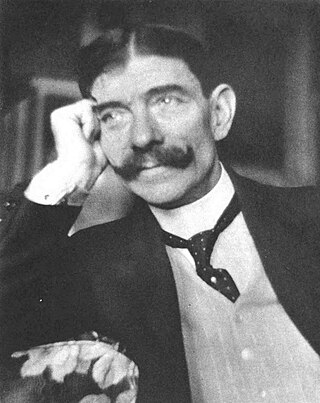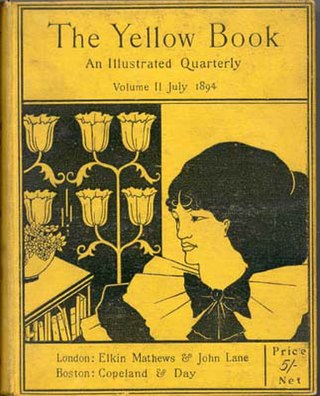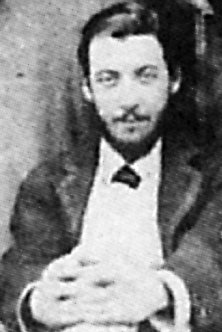
Oscar Fingal O'Fflahertie Wills Wilde was an Irish poet and playwright. After writing in different forms throughout the 1880s, he became one of the most popular playwrights in London in the early 1890s. He is best remembered for his epigrams and plays, his novel The Picture of Dorian Gray, and the circumstances of his criminal conviction for gross indecency for consensual homosexual acts in "one of the first celebrity trials", imprisonment, and early death from meningitis at age 46.

The Importance of Being Earnest, A Trivial Comedy for Serious People is a play by Oscar Wilde. First performed on 14 February 1895 at the St James's Theatre in London, it is a farcical comedy in which the protagonists maintain fictitious personae to escape burdensome social obligations. Working within the social conventions of late Victorian London, the play's major themes are the triviality with which it treats institutions as serious as marriage and the resulting satire of Victorian ways. Some contemporary reviews praised the play's humour and the culmination of Wilde's artistic career, while others were cautious about its lack of social messages. Its high farce and witty dialogue have helped make The Importance of Being Earnest Wilde's most enduringly popular play.

The Picture of Dorian Gray is a philosophical novel by Irish writer Oscar Wilde. A shorter novella-length version was published in the July 1890 issue of the American periodical Lippincott's Monthly Magazine. The novel-length version was published in April 1891.

Frank Harris was an Irish-American editor, novelist, short story writer, journalist and publisher, who was friendly with many well-known figures of his day.

Lord Alfred Bruce Douglas, also known as Bosie Douglas, was an English poet and journalist, and a lover of Oscar Wilde. At Oxford he edited an undergraduate journal, The Spirit Lamp, that carried a homoerotic subtext, and met Wilde, starting a close but stormy relationship. Douglas's father, the Marquess of Queensberry, abhorred it and set out to humiliate Wilde, publicly accusing him of homosexuality. Wilde sued him for criminal libel, but some intimate notes were found and Wilde was later imprisoned. On his release, he briefly lived with Douglas in Naples, but they had separated by the time Wilde died in 1900. Douglas married a poet, Olive Custance, in 1902 and had a son, Raymond.

Sir Rupert Charles Hart-Davis was an English publisher and editor. He founded the publishing company Rupert Hart-Davis Ltd. As a biographer, he is remembered for his Hugh Walpole (1952), as an editor, for his Collected Letters of Oscar Wilde (1962), and, as both editor and part-author, for the Lyttelton/Hart-Davis Letters.

Sir Henry Maximilian Beerbohm was an English essayist, parodist and caricaturist under the signature Max. He first became known in the 1890s as a dandy and a humorist. He was the drama critic for the Saturday Review from 1898 until 1910, when he relocated to Rapallo, Italy. In his later years he was popular for his occasional radio broadcasts. Among his best-known works is his only novel, Zuleika Dobson, published in 1911. His caricatures, drawn usually in pen or pencil with muted watercolour tinting, are in many public collections.

Aubrey Vincent Beardsley was an English illustrator and author. His black ink drawings were influenced by Japanese woodcuts, and depicted the grotesque, the decadent, and the erotic. He was a leading figure in the aesthetic movement which also included Oscar Wilde and James McNeill Whistler. Beardsley's contribution to the development of the Art Nouveau and poster styles was significant despite his early death from tuberculosis. He is one of the important Modern Style figures.

The Yellow Book was a British quarterly literary periodical that was published in London from 1894 to 1897. It was published at The Bodley Head Publishing House by Elkin Mathews and John Lane, and later by John Lane alone, and edited by the American Henry Harland. The periodical was priced at 5 shillings and lent its name to the "Yellow Nineties", referring to the decade of its operation.

George Meredith was an English novelist and poet of the Victorian era. At first his focus was poetry, influenced by John Keats among others, but he gradually established a reputation as a novelist. The Ordeal of Richard Feverel (1859) briefly scandalised Victorian literary circles. Of his later novels, the most enduring is The Egoist (1879), though in his lifetime his greatest success was Diana of the Crossways (1885). His novels were innovative in their attention to characters' psychology, and also took a close interest in social change. His style, in both poetry and prose, was noted for its syntactic complexity; Oscar Wilde likened it to "chaos illumined by brilliant flashes of lightning". He was an encourager of other novelists, as well as an influence on them; among those to benefit were Robert Louis Stevenson and George Gissing. He was nominated for the Nobel Prize in Literature seven times.

Svengali is a character in the novel Trilby which was first published in 1894 by George du Maurier. Svengali is a man who seduces, dominates and exploits Trilby, a young half-Irish girl, and makes her into a famous singer.

Ada Esther Leverson was a British writer who is known for her friendship with Oscar Wilde and for her work as a witty novelist of the fin-de-siècle.

The Happy Hypocrite: A Fairy Tale for Tired Men is a short story with moral implications, first published in a separate volume by Max Beerbohm in 1897. His earliest short story, "The Happy Hypocrite" first appeared in Volume XI of The Yellow Book in October, 1896. Beerbohm's tale is a lighter, more humorous version of Oscar Wilde's 1890 classic tale of moral degeneration, The Picture of Dorian Gray.

William Charles Kingsbury Wilde was an Irish journalist and poet of the Victorian era and the older brother of Oscar Wilde.

De Profundis is a letter written by Oscar Wilde during his imprisonment in Reading Gaol, to "Bosie".
The Works of Max Beerbohm was the first book published by English caricaturist, essayist and parodist Max Beerbohm. It was published in 1896 when Beerbohm was aged 24.

Rossetti and His Circle is a book of twenty-three caricatures by English caricaturist, essayist and parodist Max Beerbohm. Published in 1922 by William Heinemann, the drawings were Beerbohm's humorous imaginings concerning the life of Dante Gabriel Rossetti and his fellow Pre-Raphaelites, the period, as he put it, "just before oneself." The book is now considered one of Beerbohm's masterpieces.

Reginald Turner was an English author, an aesthete and a member of the circle of Oscar Wilde. He worked as a journalist, wrote twelve novels, and his correspondence has been published, but he is best known as one of the few friends who remained loyal to Wilde when he was imprisoned and who supported him after his release.

A Peep into the Past is a 1923 unauthorized and privately printed essay on Oscar Wilde by caricaturist and parodist Max Beerbohm.

Vanity Fair was a British weekly magazine that was published from 1868 to 1914. Founded by Thomas Gibson Bowles in London, the magazine included articles on fashion, theatre, current events as well as word games and serial fiction. The cream of the period’s "society magazines", it is best known for its witty prose and caricatures of famous people of Victorian and Edwardian society, including artists, athletes, royalty, statesmen, scientists, authors, actors, business people and scholars.


















